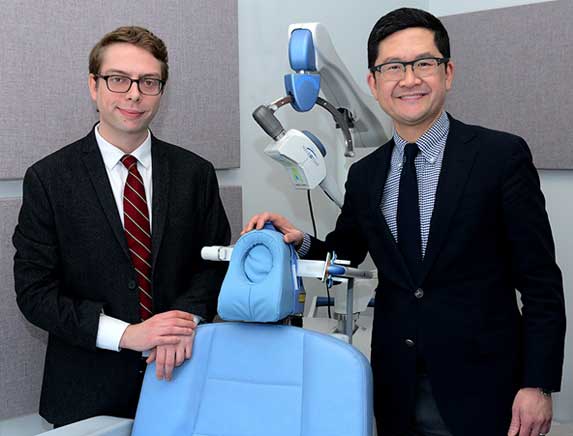What do you think of this article?
By Dr. David Woo - Published on January 23, 2020
Last updated on November 8, 2024

Updated on September 11, 2024
dTMS, meaning “deep TMS therapy”, is a type of transcranial magnetic stimulation (TMS) therapy that is FDA-approved to treat patients diagnosed with major depressive disorder (MDD), major depressive disorder with anxiety (also known as anxious depression) and obsessive-compulsive disorder (OCD).
Additionally, a more recent development in Deep TMS, called theta burst stimulation (TBS), which delivers TMS at a lower level of intensity and within a shorter time, has been FDA-approved for treating depression.
During TMS treatments, a doctor or nurse fits a helmet containing a metal coil over the patient’s head. The coil emits magnetic pulses that noninvasively stimulate brain cells located in specific regions associated with mood (1). Deep TMS works the same way, but uses more advanced technology for better results (2). In this article, we explore dTMS, how it works, and why we use it here at Madison Avenue TMS & Psychiatry in NYC.
Jump to:
- Is dTMS For Depression Effective?
- How Does dTMS Therapy Compare To rTMS Therapy?
- High-frequency dTMS and Theta Burst Stimulation (TBS)
- rTMS, dTMS, And TBS Compared
- dTMS Therapy For Other Mood Disorders
- dTMS And Depression Medications
- dTMS Side Effects And Safety
- Get dTMS Near Me In NYC
Is dTMS For Depression Effective?
Yes. Deep TMS has been clinically proven to relieve depressive symptoms, even in patients diagnosed with treatment-resistant depression. A randomized clinical study found that patients who receive dTMS are twice as likely to achieve remission compared to patients who were given a sham or placebo treatment (3).
How Does dTMS Therapy Compare To rTMS Therapy?
Deep TMS is a type of repetitive TMS (rTMS). rTMS methods involve a series of magnetic pulses delivered to the brain, as opposed to single-pulse TMS, which is used in research settings for diagnostic purposes. Both dTMS and rTMS are used in clinics to successfully treat depressive symptoms.
Both dTMS and rTMS are FDA-approved to relieve depressive symptoms in patients diagnosed with treatment-resistant MDD. So, what’s the difference between dTMS and rTMS?
- The device used: Deep TMS is administered using the BrainsWay device, while rTMS is administered using the Neurostar® device.
- The shape of the magnetic coil: Deep TMS uses an H-coil, while rTMS uses an infinity coil (shaped like the infinity symbol).
- Stimulation depth: Deep TMS can stimulate the brain four to six centimeters below the brain’s surface, while rTMS can only stimulate one to two centimeters below the brain’s surface (3,4).
- FDA-approved indications: Only dTMS has been FDA-approved to treat anxious depression and OCD.
High-frequency dTMS And Theta Burst Stimulation (TBS)
At Madison Avenue TMS & Psychiatry, we offer two kinds of Deep TMS treatments:
- High-frequency dTMS delivers pulses at a rate of 5 Hz or higher. These frequencies generally increase excitability in the brain, stimulating nerve activity in underactive regions of the brain (5).
- Theta burst stimulation is a more recently developed method that has produced similar, if not greater, effects on brain activity when compared to traditional rTMS in clinical studies. Theta burst stimulation uses a more complex TMS signal that increases nerve activity with theta waves. Theta waves have been shown to activate parts of the mood circuit in the brain and facilitate the formation of new communication pathways. Theta burst dTMS has been shown to treat depression effectively, at a lower level of intensity, and in a shorter amount of time (three to ten minutes, compared to 20 minutes with traditional rTMS) (6).
Both high-frequency TMS and theta burst TMS are FDA-approved for treatment-resistant depression.
rTMS, dTMS, And TBS Compared
| Feature/Criteria | rTMS | dTMS | TBS |
| FDA Approval | Yes, for depression (2008) | Yes, for depression (2013), anxious depression, and OCD (2018) | Yes, for depression (2018) |
| Device Used | Neurostar® | BrainsWay | Various devices, including BrainsWay and others |
| Magnetic Coil Shape | Infinity coil (figure-8 shape) | H-coil | Depends on the device |
| Stimulation Depth | 1-2 cm | 4-6 cm | Varies, generally similar to dTMS |
| Treatment Duration | 20-40 minutes | 20-40 minutes | 3-10 minutes |
| Frequency | High-frequency (5 Hz or higher) | High-frequency (5 Hz or higher) | Burst of 3 pulses at 50 Hz, repeated every 200 ms (5 Hz) |
| Target Conditions | Depression | Depression, anxiety, OCD | Depression |
| Treatment Sessions | Daily for 4-6 weeks | Daily for 4-6 weeks | Daily for 4-6 weeks, often shorter sessions |
| Side Effects | Scalp discomfort, headache, rare seizure | Scalp discomfort, headache, rare seizure | Scalp discomfort, headache, rare seizure |
| Efficacy | Proven effective for depression, with off-label uses for other conditions | Proven effective for depression, OCD, with off-label uses for other conditions | Proven effective for the same conditions as dTMS, with, potentially greater efficacy |
| Advantages | Established treatment, widely available | Deeper brain stimulation, effective for OCD | Shorter treatment time, lower intensity |
dTMS Therapy For Other Mood Disorders
TMS has a proven success rate in treating depression, but it is also effective in treating other mood disorders. Both dTMS and rTMS can be used to safely treat symptoms of OCD, though only dTMS is FDA-approved for OCD treatment (and neither is approved yet for other non-depression conditions). FDA approval benefits patients because insurance companies will cover more of the treatment costs, but it is not the only indicator that a treatment option is safe and effective.
A systematic review and meta-analysis of the use of TMS for various mental health conditions found that TMS, including rTMS, dTMS, and TBS are significantly more effective than sham treatments in reducing symptoms of depression, OCD, PTSD, and schizophrenia. TMS, particularly high-frequency stimulation, showed medium to large effect sizes for unipolar depression, while theta burst stimulation was effective in shorter durations with potentially greater efficacy (7).
dTMS And Depression Medications
dTMS, like all other kinds of TMS, is FDA-approved for treatment-resistant depression, i.e., for patients who have not acheived satisfactory results from pharmaceutical medications.
Everyone responds to medications differently, and the success rate of depression medications can vary widely from person to person. Finding the right medication, and the right dose, is crucial for patients who wish to find relief from their symptoms and avoid unpleasant side-effects. That’s why we offer medication management services at Madison Avenue TMS & Psychiatry. Through having regular telehealth consultations with a sympathetic, qualified psychiatric professional, we can help you find the medication regime that works best for you.
For patients who are struggling to find relief through traditional medications, dTMS therapy offers a noninvasive, drug-free alternative that is safe to take while pregnant, on hormone therapy, or in other situations that make a non-pharmaceutical treatment more attractive. TMS is generally well-tolerated, with rare, mild side-effects for a small percentage of patients.
dTMS Side Effects, Safety, And Reliability
At Madison Avenue TMS & Psychiatry, our patients’ safety is our number one priority. TMS treatments are considered low-risk procedures with mild side effects, such as scalp discomfort and headache, which can be treated with over-the-counter pain medication. In very rare cases, there may be a risk of seizure with TMS, so you should check whether you are a good candidate for dTMS with a qualified medical professional.
The risk of seizure for the Neurostar® rTMS infinity coil is one out of 30,000 sessions (8). The risk of seizure for BrainsWay’s H-coil is approximately one point five out of 10,000 sessions (9).
We use the BrainsWay device at Madison Avenue TMS & Psychiatry. One big reason for this is that the BrainsWay process does not have the risk of error of missing the dorsolateral prefrontal cortex (DLPFC), the area we are targeting for the relief of depression. You achieve treatment of that brain center every time you give a treatment due to the wideness and depth of the magnetic waves being administered.
With Neurostar, as with all of the other infinity coils on the market (Magstim, Magventure, and Nexstim), there is an inherent error of not stimulating the DLPFC, making the treatment less reliable.
Get dTMS Therapy Near Me In NYC
If you or a loved one is struggling with depression or other mood disorders and in the New York City area, Madison Avenue TMS & Psychiatry is here to help. Our advanced dTMS therapy offers a clinically proven, non-invasive treatment option that can provide relief even for those with treatment-resistant conditions.
With our commitment to patient safety and the effectiveness of our cutting-edge technology, we strive to improve your quality of life. Don’t suffer in silence—call us on (212) 731-2033 or contact us on our website today to learn more about how dTMS therapy can make a difference in your journey to better mental health.
Learn more about TMS therapy:
Sources:
- Siebner, H. R., Funke, K., Aberra, A. S., Antal, A., Bestmann, S., Chen, R., Classen, J., Davare, M., Di Lazzaro, V., Fox, P. T., Hallett, M., Karabanov, A. N., Kesselheim, J., Beck, M. M., Koch, G., Liebetanz, D., Meunier, S., Miniussi, C., Paulus, W., . . . Ugawa, Y. Transcranial magnetic stimulation of the brain: What is stimulated? – A consensus and critical position paper. Clinical Neurophysiology. 2022;140, 59-97. Link. Accessed July 26, 2024.
- What is Deep TMS and How Does It Work? BrainsWay. Link. Publication Date Unavailable. Accessed July 26, 2024.
- Levkovitz Y, Isserles M, Padberg F, Lisanby SH, Bystritsky A, Xia G, Tendler A, Daskalakis ZJ, Winston JL, Dannon P, Hafez HM, Reti IM, Morales OG, Schlaepfer TE, Hollander E, Berman JA, Husain MM, Sofer U, Stein A, Adler S, Deutsch L, Deutsch F, Roth Y, George MS, and Zangen A. Efficacy and safety of deep transcranial magnetic stimulation for major depression: a prospective multicenter randomized controlled trial. World Psychiatry. February 2015;14(1):64–73. Link. Accessed July 26, 2024.
- Klomjai W, Katz R, Lackmy-Vallée A. Basic principles of transcranial magnetic stimulation (TMS) and repetitive TMS (rTMS). Ann Phys Rehabil Med. 2015;58(4):208-213. Link. Accessed July 26, 2024.
- Wang J, Deng XP, Wu YY, Li XL, Feng ZJ, Wang HX, Jing Y, Zhao N, Zang YF, Zhang J. High-Frequency rTMS of the Motor Cortex Modulates Cerebellar and Widespread Activity as Revealed by SVM. Front Neurosci. March 19 2020;14:186. Link. Accessed July 26, 2024.
- Chung SW, Hoy KE, Fitzgerald PB. Theta-burst stimulation: a new form of TMS treatment for depression?. Depress Anxiety. 2015;32(3):182-192. Link. Accessed July 26, 2024.
- Hyde, J., Carr, H., Kelley, N., Seneviratne, R., Reed, C., Parlatini, V., Garner, M., Solmi, M., Rosson, S., Cortese, S., & Brandt, V.. Efficacy of neurostimulation across mental disorders: Systematic review and meta-analysis of 208 randomized controlled trials. Molecular Psychiatry. 2022;27(6), 2709-2719. Link. Accessed July 26, 2024.
- Janicak P, Heart K, McGugan B. 166 Post Market Rate of Seizures During TMS Treatment with NeuroStar® System Appears to Be Lower than Previously Estimated. CNS Spectrums. 2020;25(2):306-306. Link. Accessed July 26, 2024.
- Tendler A, Harmelech T, Gersner R, Roth Y. Seizures provoked by H-coils from 2010 to 2020. Brain Stimul. 2021;14(1):66-68. https://pubmed.ncbi.nlm.nih.gov/33197655/. Link. Accessed July 26, 2024.
Dr. David Woo is the owner and head clinical psychiatrist at Madison Avenue TMS and Therapy in New York City. Dr. Woo has been seeing patients in private practice since 2002, always with the goals of combining evidence-based medicine with psychodynamic psychotherapy and collaborating with other mental health professionals to ensure the best possible outcomes for his patients. He has been certified to administer TMS at his practice since 2017. His greatest clinical interests include helping patients suffering from depression, anxiety, and obsessive compulsive disorder.
Follow Dr. Woo On









